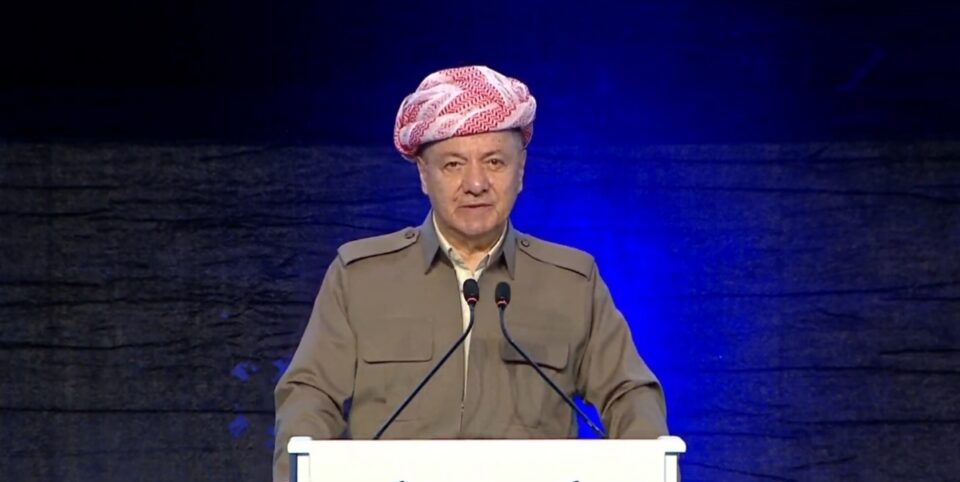Sema
Kurdish leader Masoud Barzani, president of the Kurdistan Democratic Party (KDP), warned on Thursday of a new kind of war threatening Kurdish society—not one fought with weapons, but one targeting beliefs, identity, and self-confidence—during a youth and student congress in Erbil that he said must mark a turning point in defending Kurdish dignity and rights.
Speaking at the merger congress of the Kurdistan Democratic Youth Union and the Kurdistan Students Union, Barzani said, “The war of the past was much easier than the current war… This is a war to eliminate belief… to eliminate the Kurdish individual’s self-confidence and hope.” He emphasized that confronting this “dangerous phenomenon” must be a national priority, and that youth should be educated with “intimacy for the country.”
A Call to Preserve National Identity
Barzani said the merger of the two youth organizations would make it easier to face current challenges, adding that the youth have long played an essential role in Kurdish history—from the September and May revolutions to the fight against ISIS. He cited the late Mustafa Barzani’s reference to youth as “a spearhead and a steel wall,” saying the younger generation must remain both proactive and defensive in protecting the Kurdish cause.
He welcomed the growing role of women in the movement, saying, “I am very pleased to hear that the proportion of women among students and youth has increased. This means that the proportion of women will increase within the party.”
“We Agreed on Partnership, Not Majority Rule”
Barzani also delivered a sharp critique of Iraq’s post-2003 political trajectory, accusing Baghdad of deviating from the federal principles agreed upon after Saddam Hussein’s fall. “We agreed on three main principles to rebuild a new Iraq: partnership, consensus, and a balance of power-sharing,” he said. He warned that imposing majority rule would only lead Iraq toward failure.
“If one party thinks it is the majority and imposes its will… Iraq will not benefit. You cannot force people to unite. The Iraqi constitution recognizes different nationalities, religions, and sects. Unity must be voluntary.”
He lamented that the constitution was not properly implemented and argued that the current federal model was being undermined, particularly in the way Baghdad handles the Kurdistan Region’s financial entitlements.
On Baghdad and Kurdish Salaries: “An Insult to the Martyrs”
Barzani expressed outrage over the Iraqi federal government’s approach to public sector salaries in Kurdistan, calling it “an insult to the blood of the martyrs.” He said the Kurdish struggle had never been about salaries, but dignity and sovereignty.
“This nation has not revolted from hunger. If you have dignity and will, there will always be money. But if you lack dignity and will, what is the value of money?”
Barzani criticized Baghdad’s handling of legal challenges to the recent Kurdish parliamentary elections and called on all Iraqi parties to respect the legitimacy granted by the Kurdish people. He said if Baghdad no longer believes in federalism, it should state it openly.
Support for Unity and Regional Peace
Domestically, Barzani urged the Kurdistan Democratic Party (KDP) and Patriotic Union of Kurdistan (PUK) to form a new regional government based on unity, warning that any cabinet lacking this foundation “is better not to be formed.” He emphasized that the next government in Kurdistan will not follow the 50%-50% power-sharing formula between the KDP and PUK.
On broader regional issues, Barzani expressed support for the peace process in Turkey and called for Kurdish unity in Syria through peaceful engagement with Damascus. “If there is a path to peace, then choosing the path of war is treason,” he said.
He added that he hopes tensions between Iran and the West will ease, enabling the region to move “towards dialogue, towards understanding,” and away from conflict.
A Final Message to Kurdish Youth
Closing his speech, Barzani urged the youth to produce results for the nation, declaring that the battle for Kurdish dignity must be taken seriously.
“We will support you with all our might, but we also ask you to have a product for your nation. That product is the war I just mentioned—the war for belief, dignity, and identity.”

